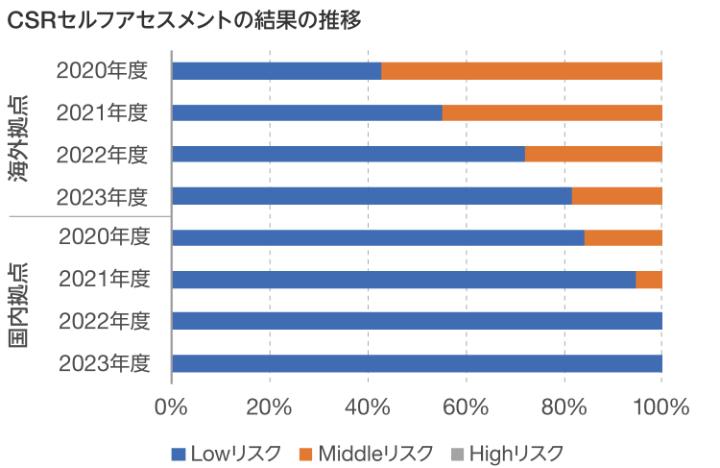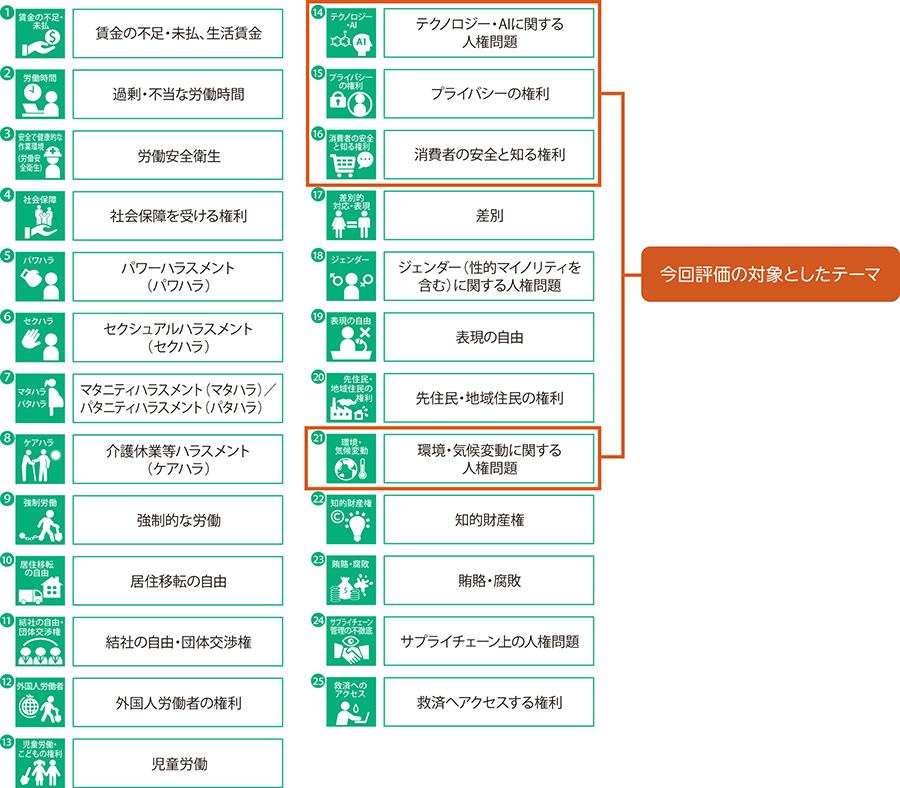Respect for Human Rights
- Approach & Initiatives
- Epson Slavery and Human Trafficking Statement
- Initiatives to Prevent Power Harassment
Approach & Initiatives
エプソンは、パーパスに基づき、さまざまな社会課題の解決に真摯に取り組み、持続可能な社会の実現を目指しています。エプソンは、その前提として、また世界各地で行うすべての企業活動の基盤として、一人ひとりの立場に立って人権を尊重することが重要であると理解しています。しかしながら、一方でまた、自社の企業活動がそのような人権に対し負の影響を与える可能性を認識しています。エプソンは、企業活動における人権の尊重は企業が果たすべき重要な責務であると定めています。
エプソンは、2005年に国連「グローバルコンパクト」に基づき、「エプソングループ 人権と労働に関する方針」を制定し、2011年の国連「ビジネスと人権に関する指導原則」(以下「指導原則」)に則った行動を実践してきました。また、2019年4月にはグローバルサプライチェーンの影響を受ける労働者やコミュニティーの権利と福祉を支援する非営利組織であるResponsible Business Alliance(以下「RBA」)に加盟し、サプライヤーの皆様と共に「RBA行動規範」に則った事業活動を進めています。
Promotion Organization
エプソンの人権尊重への取り組みは、人的資本・健康経営担当執行役員の責任の下、DE&I戦略推進部門を中心に、サステナビリティ主管部門、RBA活動推進主管部門、サプライチェーンCSR推進主管部門、人事部門をはじめとする本社関係部門と連携し、また国内外関係会社の人権主管部門および関係部門とのネットワークを構築して行っています。
エプソングループ 人権方針
昨今の国際社会における「人権」に対する意識や課題の変化を踏まえ、人権への取り組みをさらに強化するため、「エプソングループ人権と労働に関する方針」を2022年4月1日付で「エプソングループ人権方針」として改定しました。「エプソングループ人権方針」は、指導原則の内容に準拠し、取締役会の決議を経て改定しました。また、経営理念および企業行動原則を補完しつつ、人権尊重に関する考え方を明確にし、その取り組みにおける最上位の指針として、この「エプソングループ人権方針」を位置づけています。これに基づき、エプソングループおよびサプライチェーンを中心に、人権への取り組みを進めています。
Human Rights Due Diligence
エプソンは、グループ会社はもとより、ビジネスパートナーを含め、製品を開発・製造・販売する事業活動に関連したバリューチェーン上の潜在的な、あるいは顕在化している人権への負の影響を特定し、それを調査して問題・課題を析出し、それを防止・是正するための国連指導原則に従った「人権デューデリジェンス」のプロセスを継続して回しています。
ビジネス上における人権デューデリジェンスのプロセスは以下の通りです。
1.人権への負の影響の特定、影響評価
2.是正計画策定、人権への負の影響の防止・軽減
3.結果/経過のモニタリング
4.コミュニケーション・報告
1.人権への負の影響の特定、影響評価
In FY2023, we again conducted an impact assessment and identified adverse human rights impacts. The following information was referenced in the assessment
-
- Recognition and knowledge through the Responsible Business Alliance (RBA) activities over the past 4 years (CSR self-assessment and RBA audits)
- Status of occurrence, consultation, and reporting of internal and supply chain incidents
- Materials such as the Ministry of Economy, Trade and Industry's "Guidelines for Respecting Human Rights in Responsible Supply Chains, etc." and "Practical Reference Materials" and information obtained through participation in the Keizaijin Caux Roundtable Stakeholder Engagement Program, etc.
その結果、当社において特に人権侵害が起きやすい領域は、自社およびグループ従業員、派遣社員、サプライヤー従業員、構内常駐業者の労働者、移住労働者に係る、下表のような労働ならびに労働安全衛生に関する事項、地域的にはアジア、業態別では製造、と改めて特定しました。
| High Priority Targets | Major Adverse Impacts | Specific Examples of Special Attention |
|---|---|---|
| Our own and Group Employees Dispatch workers Supplier employees On-site service vendor employees Migrant workers |
Forced labor | -The burden of employment-related agency fees,
placement fees, and other expenses -Passport custody -Compulsory overtime -Freedom to resign |
| Young workers | -Overtime, night work, hazardous work | |
| Overwork | -Violations of laws and internationally recognized human rights norms regarding working hours, and long working hours that are detrimental to health. | |
| Wages and Benefits | -Non-payment of wages for overtime hours -Non-payment or reduction of wages as a disciplinary measure |
|
| Inhuman treatment | -Harassment | |
| Discrimination | -Discrimination in dismissal and treatment -Pregnancy tests, dismissal of pregnant women |
|
| Occupational Health and Safety | -Hazardous and noxious working environment -Protection of female workers -Protection of workers in emergency situations |
2. 人権への負の影響の防止・軽減
エプソンは、2017年度から、RBA行動規範および調査票に準拠したCSRセルフアセスメント調査を海外製造拠点に対して行っています。2019年4月にRBAに加盟した後は、RBA行動規範のグループへの周知・浸透活動を進めるとともに、RBAの調査票に準拠して、セイコーエプソン事業所・国内関係会社・海外現地法人、またサプライヤーに対し、年一回、継続してCSRセルフアセスメント調査を実施しています。CSRセルフアセスメント調査の結果についてはRBAに報告しています。各事業所・各社・各サプライヤーは、人権への負の影響の所在を特定し、特定された負の影響に対して是正計画を策定し、是正・軽減を図っています。
2023年度CSRセルフアセスメント調査の概要
| Topic | Description |
|---|---|
| Survey Contents | A. 労働:雇用の自主性、若年労働者、労働時間、賃金、非人道的な扱い、差別、結社の自由 など B. 安全衛生:職場の安全衛生、労働災害、寮・食堂 など C. 環境:許可証と報告、汚染、危険有害物、排水・廃棄物、大気汚染、エネルギー・温室効果ガス排出 など D. 倫理:誠実なビジネス、不適切な利益の排除、知的財産権、公正な事業、通報、責任ある鉱物調達、個人情報保護 など E. マネジメントシステム:コミットメント、説明責任、リスク評価、研修、サプライヤー など |
| Implementation Period | 調査:2023年4月~6月 課題把握、改善への取り組み:2023年7月~ |
| 調査対象 | セイコーエプソン事業所 11事業所 国内関係会社 8社(うち製造会社6社、販売その他会社2社) 海外現地法人 49社(うち製造現法17社、販売その他現法32社) |
| Questionnaire | RBA Self-Assessment Questionnaire(SAQ) |
| Addressing Adverse Impacts | Develop a corrective action plan and work on redress and mitigation with the support and cooperation of the relevant headquarters departments in charge. |
2023年度の調査結果(総括)
・各事業所・国内関係会社・海外現地法人におけるCSRセルフアセスメント調査の結果、どの拠点においてもハイリスクはありませんでした。
・2022年度の調査でミドルリスクとなった海外販売現法14拠点に対して、
①本社各主管部門によるグループ規程の周知、ガイダンス実施
②SAQ設問の解説、回答内容の是正(実態と回答のズレを修正)
を実施したことにより、14拠点すべての点数が改善され、うち5拠点については、ローリスクとなりました。全体では、ミドルリスク拠点は前年の20%から13%へと減少・改善しました。
・調査後も、各拠点に対し、グループ方針やグループ規程、ルール・ガイドライン等の一層の浸透を進め、重大な人権侵害リスクを継続して抑制し、またミドルリスク拠点のさらなる減少を図っています。
2020年度以降のCSRセルフアセスメントの結果の推移は以下のとおりです。毎年の是正活動の結果、年々リスクレベルは低下しています。

* Lowリスクは、評価点85点超で、基本的に、RBA行動規範の要求レベルで行動ができている
Middleリスクは、評価点65点超85点以下で、RBA行動規範の要求レベルで行動ができていない項目があり、自主
的改善が必要
Highリスクは、評価点65点以下で、RBA行動規範の要求レベルで行動ができていない項目について、改善および
結果のモニタリングが必要
3. 結果・経過のモニタリング
Seiko Epson business offices, affiliated companies and other sites, each business office, each company, and each supplier are working to correct and reduce negative human rights impacts according to a corrective action plan with the involvement of executive management. For serious negative impacts, the relevant lead department at the headquarters confirms the completion of the remediation.
Epson continues to conduct the CSR self-assessment survey once a year to check the status of correction of nonconformities to RBA Code of Conduct at each company and business location. Furthermore, seven of Epson's main manufacturing sites in Southeast Asia and China (as of May 2024) have voluntarily undergone RBA's Validated Assessment Program (VAP) audits on an ongoing basis in order to identify and correct issues from a third-party perspective and improve the level of their activities. To date, Epson has obtained Platinum certification, which is awarded when a company achieves a perfect score (200 points) with no RBA Code of Conduct nonconformities, at production site in Indonesia, Malaysia, Thailand, China, and the Philippines.
Locations currently certified Platinum and Gold
| Site name | Main Products Manufactured | Recognition | Expiration Date |
|---|---|---|---|
| (Country) | (Score) | ||
| PT. Indonesia Epson Industry | Inkjet printers, large format printers, small printers, impact dot matrix printers | Platinum | 2026/2/28 |
| (Indonesia) | (200) | ||
| Epson Precision (Philippines), Inc. | 3LCD projectors, Inkjet printers | Platinum | October 16, 2025 |
| (Philippines) | (200) | ||
| PT. Epson Batam | Inkjet printer ink cartridges and ink bottles, scanners | Platinum | 2025/3/16 |
| (Indonesia) | (200) | ||
| Epson Engineering (Shenzhen) Ltd. | Inkjet printers, large format printers, 3LCD projector, industrial robots | gold | 2024/12/7 |
| (China) | (196.5 points) |
The following are some of the major examples of adverse human rights impacts identified in FY2023 as a result of CSR assessment surveys or RBA VAP audits within the Group, which have been addressed or are being addressed on an ongoing basis.
| Adverse impacts | Place of Occurrence | Status of addressing |
|---|---|---|
| Long working hours by employees of business partners | Business partners | Discussed corrective measures with business partners, and actions have been taken. |
| Workers bear the recruitment fees | Business partners | Reimbursed |
| Violation of the Law concerning Worker Dispatching | Manufacturing company | Keep outsourced operations within the scope of the law. |
| Improvement of the emergency exit doors on the factory evacuation route | Manufacturing company | The structure of the relevant emergency exit doors have been reviewed. |
In addition, adverse human rights impacts that have been addressed and provided for remediation include the following
| Adverse impacts | Place of Occurrence | Status of addressing |
|---|---|---|
| Brokerage/recruitment fees to agencies paid by migrant workers | Manufacturing company | Stopped migrant workers' burden and reimbursed to workers |
| Custody of migrant workers’ passports | Manufacturing company | Thoroughly prohibit passports from being kept in custody |
| Agreement process with workers regarding overtime | Sales company | Clarification of the process for requesting overtime work |
| Advance payment by the applicant for the cost of medical examinations at the time of hiring | Manufacturing company | Reimbursed to the individual and changed to a process that does not require advance payment |
| Inadequate legal requirements in the contract between staffing agencies and the employees they dispatch | Staffing agency | Update the contract to comply with the law |
| Failure to record overtime work | Staffing agency | Payment of unpaid overtime wages and improvement of the overtime work record system |
| Errors in the calculation of the amount of withholding at source | Staffing agency | Adjustment of withholding tax payments, updating of calculation system |
| Failure to pay legal reserves related to employees | Business partners | Discussions and improvements have been made with the business partner. |
| Failure to manage working hours | Business partners | Discussions and improvements have been made with the business partner. |
| Failure to pay overtime wages by contractors performing services on premises | Business partners | Overtime wages have been paid in accordance with the local laws |
4. コミュニケーション・報告
The status of our efforts to address the issues requiring corrective actions is reviewed annually by the responsible manager and reported on our website and in our Sustainability Report. Global efforts of the Epson Group are reported in a statement on modern slavery and human trafficking.
良好な労使関係を構築し、維持するため、エプソンは、従業員に対し積極的に情報を提供し、真摯に対話や協議を行っています。また、お客さまに対しても、エプソンの人権尊重への取り組み状況について、必要に応じ随時コミュニケーションを図っています。
エプソンにおいては、労働や安全衛生といった領域が最も人権侵害のリスクが高いと認識していますが、2023年度はこれら以外の領域についても、評価を行いました。具体的には、法務省が「企業が尊重すべき人権の分野」として提示する25の類型を参照し、「テクノロジー・AI」「プライバシーの権利」「消費者の安全と知る権利」「表現の自由」「先住民族・地域住民の権利」「環境・気候変動」「知的財産権」「賄賂・腐敗」の8つのうち、深刻度(人権回復の困難度)と影響の規模・範囲を検討したうえで、当社の企業活動との関連性を考慮し、AI、プライバシー、消費者の安全(特に製品安全性、表示)、環境・気候変動の4つをテーマとして設定しました。
企業が尊重すべき人権の分野

この4つについて、一般的に考えられる人権の負の影響、エプソンで関係しそうな負の影響、負の影響を防止・停止・軽減するための法令や一般的な仕組み・枠組み、エプソンにおける仕組み・枠組み、ステークホルダーからの相談・通報の窓口の有無、実際の相談・通報の有無等に関し、それぞれ関係部門とディスカションを行いました。その結果、特にAIについては、現時点では社内での利活用が限定的であり、深刻な負の影響は認められないものの、今後技術が劇的に発展していく可能性があり、社会に対する影響が大きいこと、当社においても社内での利活用のほか事業における開発や製品への組み込みなど、さまざまな展開の可能性と、それによる人権への負の影響が考えられることから、継続してモニタリングをしていくこととしています。ほかの3つのテーマについても、現時点で深刻な負の影響は認められませんでしたが、継続して見守りをしていきます。
Responding to Harassment by Customers
お客さまからのお問い合わせには商品やサービス等の問題に関し、改善を求める正当なクレームがある一方、ごく一部ではありますが、社会通念に照らし不相当な要求や言動によって、応対する従業者の人格が否定されたり、尊厳が傷つけられたりする場合があります。これらは、継続的なサービス提供を阻害し、サービス品質の悪化を招きます。
このようなカスタマーハラスメントへの、社会の関心が高まっています。エプソンでは、2024年度、セイコーエプソンならびに国内関係会社の販売・サービス部門を中心にアンケート調査およびヒアリングを行いました。その結果、エプソンにおいても、一部で心身への悪影響など深刻なカスタマーハラスメントの被害があることが確認されました。これを受け、エプソンでは、厚生労働省「カスタマーハラスメント企業対策マニュアル」等を参照し、以下の対応をとっています。
・「エプソン国内グループ カスタマーハラスメントに対する指針」を制定(2025年3月21日)し、社内外への周知を行いました。
・カスタマーハラスメントに該当する言動があったと当社が判断した場合は、毅然(きぜん)とした態度で対応します。
商品・サービスの提供やお客さま対応をお断りする場合があります。また、カスタマーハラスメントが継続する場合や、悪質なもの、
刑罰法規に触れると判断できる場合等は、警察・弁護士等と連携して対処することがあります。
・カスタマーハラスメントを受けた従業者は、上司への報告を行い、組織としての対応をとることを基本としつつ、相談窓口の利用
について周知しました。
・必要に応じ、被害を受けた従業者へのメンタルケアを含めた配慮を行います。
なお、エプソングループがお取引先さま等に対するハラスメントを起こすことのないよう、エプソングループ社員に対しても、ハラスメント教育等において、改めて周知・徹底を行っていきます。
*Please see below for information on the Epson domestic groups in scope.
Grievance Mechanism
エプソンは、エプソン・ヘルプラインをはじめ、ハラスメント相談窓口、長時間労働相談窓口、従業員相談室、ダイバーシティに関する相談窓口、外国人向け相談窓口など、各種相談窓口を設置し、従業員(契約社員・パートタイマー・アルバイト・派遣労働者等を含みます)からの人権に関する相談・通報に対応しています。これらの専門窓口が所管しない人権関連の相談・通報はエプソン・ヘルプライン、ダイバーシティに関する相談窓口が受け付けています。各窓口を中心に、相談・通報者本人の意向も踏まえつつ、事実確認を行って、救済のための対応のほか、状況の是正と再発防止の取り組みを行っています。2023年度は、これらの窓口と情報交換を行い、人権に関する相談・通報の全体状況を把握する取り組みを始めました。
また、エプソンでは、取引先向けの相談・通報窓口を設置しているほか、お客さまや投資家、地域住民の方など全てのステークホルダーの皆さまへは、自社ウェブサイトのお問い合わせ窓口に加え、2024年4月から一般社団法人 ビジネスと人権対話救済機構(JaCER)に加入し、JaCERが提供する対話救済プラットフォームによる相談・通報の受付を開始しました。JaCERは、「国連ビジネスと人権に関する指導原則」に準拠して、多数の企業が関わる協働型の苦情処理プラットフォームを提供し、専門的な立場から会員企業の苦情処理への支援・推進を行うことを目指す組織です。これらの窓口を活用し、幅広いステークホルダーの皆さまからの人権に関するご相談・通報等に適切に対応していきます。
以上の相談・通報窓口は、通報情報を厳格に管理し、通報者への報復行為を禁止し、匿名性を確保して運用しています。
Education and Training
人権に関する教育は、従前からRBA行動規範やその詳細ルールについて社内および国内外の人事、安全衛生、環境、倫理、サプライチェーン管理等の業務に従事する関係部門・関係者を中心に周知を図ってきていますが、2021年度は、「エプソングループ人権方針」の改定にあたり、取締役およびセイコーエプソン本社関係機能主管部門のメンバーや、国内外関係会社の人事部門を中心とした関係者に対し、改めて「ビジネスと人権」に関する勉強会を行いました。2022年度には、グローバルにビジネスを行う上で必須の「ビジネスと人権」の基礎と、エプソンの人権尊重への取り組みを学ぶことを通じ、人権尊重への意識を高め、人権侵害を防ぐことを目的として、セイコーエプソンおよび国内関係会社の役員、従業員、契約社員、派遣社員などを対象としたe-ラーニングを実施しました。2023年9月末時点で受講者数は18,473人となっています。
2023年度は、この「ビジネスと人権」に関する教育を、海外主要現地法人7社(製造・販売)において、マネージャー以上を主な受講者としてe-ラーニングで実施しました。この受講率は2024年6月末時点で92.7%となっています。2024年度はすべての海外現地法人にて実施する予定です。
Epson Slavery and Human Trafficking Statement
エプソンは、英国2015年現代奴隷法やオーストラリア2018年現代奴隷法、カナダ2024年サプライチェーンにおける強制労働・児童労働の防止等に関する法律および米国カリフォルニア州サプライチェーン透明法などに基づき、現代奴隷や人身売買をサプライチェーンから撲滅するための方針やエプソンが取り組んだ結果を以下の通り報告します。
Epson Slavery & Human Trafficking Statement for Financial Year 2023 (PDF, 7MB)
Statement on Modern Slavery and Trafficking in Persons FY2023 (PDF, 1.2MB)
Epson Slavery & Human Trafficking Statement for Financial Year 2022 (PDF, 1,033KB)
Statement on Modern Slavery and Human Trafficking 2022 (PDF, 991KB)
Epson Slavery & Human Trafficking Statement for Financial Year 2021 (PDF, 191KB)
Statement on Modern Slavery and Human Trafficking 2021 (PDF, 901KB)
Epson Slavery & Human Trafficking Statement for Financial Year 2020 (PDF, 171KB)
2020 Statement on Modern Slavery and Human Trafficking (PDF, 843KB)
Epson Slavery & Human Trafficking Statement for Financial Year 2019 (PDF, 234KB)
2019 Statement on Modern Slavery and Human Trafficking (Japanese Tentative Translation) (PDF, 875KB)
Epson Slavery & Human Trafficking Statement for Financial Year 2018 (PDF, 223KB)
Statement on Modern Slavery and Trafficking in Persons 2018 (PDF, 869KB)
Initiatives to Prevent Power Harassment
Employee Advisory Service
Epson seeks to create a fair and pleasant working environment. Toward this end, we have set up an advisory service and are addressing grievances to prevent and stamp out power harassment. In FY2024, we added a new external reporting channel to accept anonymous claims. We also provide training to personnel who handle grievances to improve their skills and reduce their stress. We do so by sharing examples of how claims have been handled in the past and sharing information on legal changes.
Power Harassment Prevention Training
We provide Group-wide training on the prevention of power harassment that is tailored to the different echelons.
For executive management, the training provides an opportunity to think about how to create an organization that is free of power harassment. For middle managers, the training reminds them of the seriousness of the impact that power harassment can have. After sharing power harassment examples, participants engage in discussions and consider preventative actions. In addition, we require all employees to take an online course every year. We also provide executives and employees who will be assigned overseas with training tailored to their needs and local circumstances. Since FY2021, we have been working to create a power-harassment-free organizational climate by taking individually tailored action in each workplace. This action takes many forms, including individual follow-up with workplaces in which health management information indicates that stress levels are high and the establishment of consultation services for managers.
Harassment Recurrence Prevention
Human rights abuses including harassment and labor-related grievances are regularly reported to executive management. This information and company responses are shared with managers and disclosed company-wide to prevent similar incidents in the future. We require Group companies to report all material harassment incidents. There have been no omissions in reporting in recent years.
Anger Management Training
Anger management training is said to be an effective way to prevent so-called power harassment (abuse of authority at work).
Seiko Epson has provided anger management training sessions since FY2015 to teach employees skills needed to control feelings of anger at work. We have held echelon- and department-based anger management training 800 times up to the end of FY2023. An introductory course teaches people the skills they need to defuse their anger and improve their control long-term, while a course in constructive criticism teaches managers and others effective communication skills. More than 13,000 Epson Group employees in Japan have taken a course. By providing its people with the proper training and skills, Epson hopes to eliminate power harassment from the workplace.
This initiative has been recognized externally. We received the 1st Japan Anger Management Business Leadership Award Grand Prize for it from the Japan Anger Management Association in June 2023.

Current as of March 31, 2024
Security Personnel Trained in Human Rights
当社は、第三者組織である取引先に保安業務を委託しており、委託先会社に人権研修の実施を依頼しています。2023年度に実施したサプライヤーを対象としたセルフアセスメントによるCSR詳細評価において、委託先会社による人権研修の実施について確認しています。



